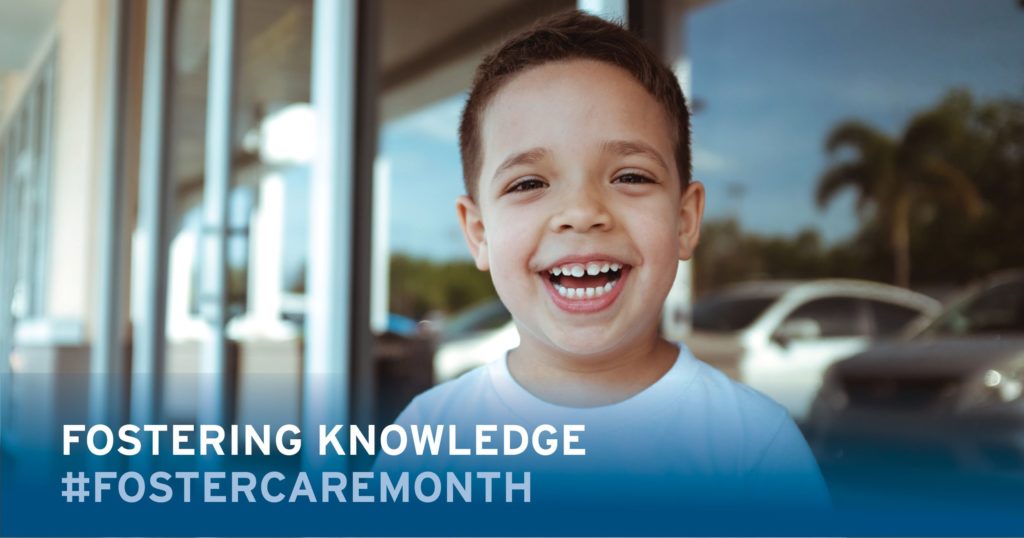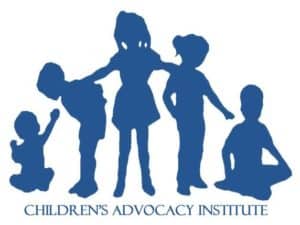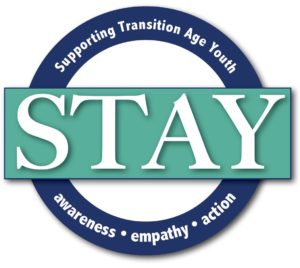
Each year, thousands of children in San Diego and Riverside Counties spend time in the dependency system (commonly known as foster care.) At no fault of their own, their lives are turned upside down, and they enter a world of new homes, new schools, court hearings, and more. Luckily, there are organizations in our community dedicated to supporting these children every step along the way.
As part of National Foster Care Month 2021, Voices for Children teamed up with four local organizations committed to serving youth in foster care: Children’s Advocacy Institute, San Diego Center for Children, Riverside STAY, and Walden Family Services. Each group shared insight into different aspects of the system from their perspective during our week of #FosteringKnowledge.

Day 1
Children’s Advocacy Institute at University of San Diego School of Law
Topic: Why and how children in foster care receive legal representation
Along with the emotional trauma children experience when placed in foster care, they face a complex and intimidating legal system. The Dependency Court steps in to function as the children’s legal parent and make life-impacting decisions on their behalf. But the court’s knowledge about the child and their family is formed not by observation and experience, but rather by the information presented to it. The court hears from the child welfare agency’s attorney. It hears from the parent’s attorney. It hears from the caseworker. It may hear from the child’s attorney and Court Appointed Special Advocate (CASA), if the child has been appointed such representation. Occasionally, it hears from the child directly.
The Children’s Advocacy Institute (CAI), based at the University of San Diego School of Law, believes that every foster child must be represented by a well-trained, client-directed attorney to protect the child’s legal interests, provide counsel, and advocate for their position to the court. California law ensures that most of our state’s foster children are represented by their own attorney. However, the same is not true across the nation, and CAI is working to change that. Attorneys are uniquely qualified to counsel children on their legal rights and options and protect their interests in court—and ensure that kids get the same type of representation as the other parties in the case.
Dependency courts also benefit from having additional information about the child, beyond what an attorney can provide. This is the unique role of the CASA, who plays a critical role in gathering information and getting to know the child in order to determine and convey to the court what actions are in the child’s best interest. When a child is represented by a well-trained attorney and a CASA, chances are good that the court will have all the information it needs to make well-informed decisions that consider the child’s counseled legal position and the surrounding facts and circumstances in the child’s life.

Day 2
Topic: Therapeutic services in foster homes
Today, 40 percent of the youth receiving treatment in the San Diego Center for Children’s residential program are in foster care and struggle with significant mental health challenges due to trauma, neglect, and abuse.
The San Diego Center for Children’s Foster Family Agency Stabilization and Treatment (FFAST) Program is the sole provider contracted with the County of San Diego to provide therapy and other supportive services to youth, ages 0 to 21, who live in the Foster Family Agency Homes in San Diego County.

Day 3
Topic: Extended Foster Care (EFC) and transition-age youth
Once a child in foster care turns 18, they can either enter Extended Foster Care or begin the transition into adult life. Created by the Leadership Riverside Class of 2020, Riverside STAY (which stands for Supporting Transitional Age Youth) is committed to supporting 18 to 21-year-olds during this critical time through its network of community partners.

Day 4
Topic: Caseloads of professionals within foster care
When a child enters foster care, a team of caring adults comes into their life. This includes foster parents or group home staff, social workers, lawyers, judges, and more. With so many people working to support them, why does a child also need a Court Appointed Special Advocate (CASA)?
A primary reason is caseloads.
Our dependency system is overburdened:
- Social workers typically manage upwards of 25 entire families at any given time.
- Lawyers may represent 100 children.
- Judges may oversee 500 or more cases.
With this amount of work, it’s impossible to know the nuances of each child’s situation. However, CASA volunteers are assigned to a single child or sibling set to ensure their unique needs are being met. Although a CASA often becomes a mentor or friend, their most important role is advocate for the youth they serve.
By being devoted to just one case, a CASA gets to see the full picture. They get to know the child and everyone in the child’s circle, from teachers and doctors to biological families and current caregivers. Based on the information they glean, they can advocate for services – such as counseling, tutoring, or physical therapy – to help the child live a happier, healthier life. At regular court hearings required for all youth in foster care, CASAs report on the child’s progress and needs. Judges then rely on this information when making decisions about the child’s future.

Day 5
Topic: Homelessness among youth in foster care
“I would’ve ended up homeless if it weren’t for Walden Family Services Transitional Housing Program (THP),” Daniela said. “I can’t imagine what would’ve happened to me.”
Daniela was well aware that when she aged out of foster care that she’d be completely alone.
“The closer I got to my 18th birthday, the more scared I got. I didn’t know the first thing about being on my own, and I had no family that I could rely on to help.”
Homelessness is a very real fear for those aging out of care. According to John Burton Advocates for Youth, 1 in 3 foster youth will be unhoused within two years of leaving the system. That’s why Daniela was so relieved when she was referred to Walden Family Services by her county social worker.
“I got so lucky getting into Walden’s housing program. Not only did they give me a safe place to live, but they were also a huge support while I was in school. Just knowing that I could call my social worker, Maggie, got me through the tough times,” she said.
Walden recognizes that stable housing is just one component of what youth need during this important time of change. This is why we provide life skills training and case managing social worker support to help our youth successfully transition to independence and adulthood.
Daniela is now a successful alumna of Walden’s THP program. She earned her undergraduate degree at Cal Poly Pomona and went on to earn her Master’s in Social Work at Cal State Long Beach.
“I owe so much to everyone at Walden. Their support and kindness inspired me to pay it forward and help others like me.”

 Voices for Children to Host Virtual Event Featuring Panel of Judges Who Oversee the Cases of Children in Foster Care
Voices for Children to Host Virtual Event Featuring Panel of Judges Who Oversee the Cases of Children in Foster Care